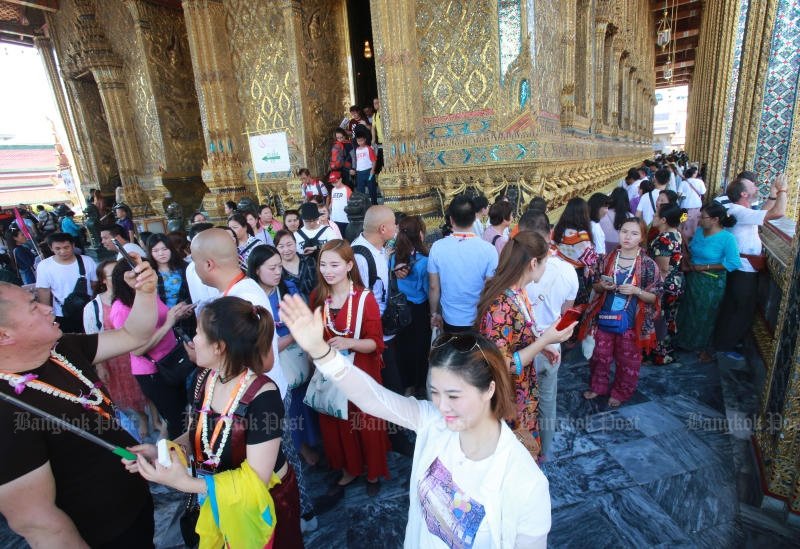Foreign Ministry says plan a ‘security risk’
The Foreign Ministry has asked the government to review the economic ministers’ proposal to offer a visa waiver to Chinese and Indian tourists as a part of the government’s economic stimulus package.
The ministry has voiced opposition to the measure proposed by the Tourism and Sports Ministry, citing national security considerations.
Last Friday, a meeting of economy-related ministers approved a raft of measures aimed at injecting another 316 billion baht into the economy.
The proposals will be forwarded to the main cabinet for endorsement on Tuesday.
One of the important measures to boost tourism, a key economic driver, is a visa waiver for Chinese and Indian visitors that will allow them to stay in Thailand for up to 30 days, though it is estimated this measure will cost the government about 12-13 billion baht in lost annual visa fee revenue.
The Tourism and Sports Ministry, which is controlled by the Bhumjaithai Party, has argued the proposed visa waiver, which will take effect from Nov 1 this year to Oct 31 next year, will help encourage Chinese and Indian tourists to come back to Thailand.
By the end of this year, the number of Chinese tourist arrivals is expected to reach 11 million, while about 2 million Indian tourists are predicted to have visited Thailand.
The number of Indian tourists is expected to increase to 3 million next year, according to the tourism and sport ministry.
However, Foreign Affairs Minister Don Praramudwinai has sent a letter to Prime Minister Prayut Chan-o-cha to oppose the visa waiver proposal.
The letter obtained by the Bangkok Post was signed on Thursday.
In the letter, the Foreign Ministry argues that the visa stamp is a measure to screen foreigners entering Thailand to prevent any potential risks to national and economic security.
It warned that the waiving of visas needs careful consideration as it will have widespread repercussions.
In particular, national security must be taken into account before a visa waiver will be offered to Chinese and Indian tourists.
India and China have a population of more than 1 billion each, and the main concern is whether Thailand is ready to cope with a potentially massive influx of tourists from the two countries entering Thailand freely.
Many of them may take the opportunity to escape from hardships, such as natural disasters in their countries in order to settle in Thailand, according to the ministry.
The ministry claimed there are several factors contributing to the sluggish economy, such as the US-China trade war and appreciation of the baht.
Therefore, waiving visas is not the right way to solve the economic slowdown, but will have an adverse impact on national security and the local way of living, it said.
Mr Don pointed out that several Chinese have taken advantage of tourism to operate businesses in Thailand and dominate and set the prices for the production of local fruit and crops in several provinces.
Mr Don also said the Thai embassy in India has had trouble dealing with false documents filed by those applying for visas.
He went on to say that Thailand still lacks a coherent and unified system to handle foreign tourists and immigrants moving in and out of the country.
The waiving of visas for tourists from the two countries with a population of over 1 billion each will potentially render the management of tourist arrivals chaotic, Mr Don said.
Despite the expected increase in tourism revenue as a result of the proposed visa waiver, Thailand will not benefit from the measure because, in the end, these two groups of tourists will only opt for services and goods provided by their compatriots in Thailand, Mr Don said.
“This will not benefit Thailand because the benefits of economic activities performed by these groups of people will exist only among themselves,” according to the letter.
If the matter is allowed to happen, in the long term it will lead to these groups of people settling down in Thailand.
This will, in turn, affect the livelihoods of Thais.
However, a source who is an immigration officer at one of Thailand’s international airports said the visa waiver proposal should not pose any problem to immigration officers because Chinese and Indian tourists rarely have problems regarding overstaying their visas.
National Security Council secretary-general Wallop Raksanoh downplayed concerns about any potential security risks from the free visa proposal.
He said the council is in regular contact with other security agencies to monitor and screen trouble-makers entering Thailand.
Pol Gen Wallop said that he did not oppose the proposal because he was confident that security agencies can handle the issue.




